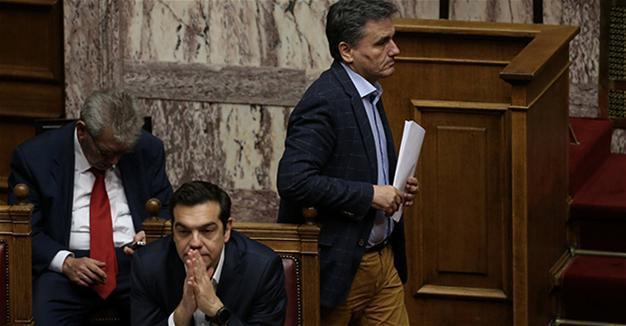Greek parliament approves new austerity measures
ATHENS - Agence France-Presse

REUTERS photo
The Greek parliament late May 18 adopted a new round of austerity cuts which the government hopes will secure a pledge of debt relief and loan disbursements by EU-IMF creditors this month.The bill entails 4.9 billion euros ($5.4 billion) in pension cuts and lower tax breaks in 2018-2021 and was passed by a majority of 153 lawmakers from the ruling coalition.
A total of 128 voted against the measure and 17 MPs from the neo-Nazi Golden Dawn party were absent during the debate as they were barred after one of their members shoved a rival in the house on Monday, prompting a showdown.
Prior to the vote police fired tear gas as an anti-cuts demonstration outside parliament turned violent, with some hooded youths throwing Molotov cocktails.
Police said more than 10,000 people took part in the protest.
Greece’s Prime Minister Alexis Tsipras grudgingly accepted to legislate another round of cuts and lower tax breaks -- applicable in 2019 and 2020 respectively -- to unlock the cash payment ahead of looming debt repayments in July.
In return, Greece will introduce poverty support measures -- such as subsidies on rent and medicine -- over the same period of time.
Athens hopes the disbursement of 7 billion euros from existing bailout loans will be approved by a meeting of eurozone finance ministers on May 22.
“We are in the final stretch... the biggest likelihood is that we’ll have a deal on May 22 or a few days later,” Greek government spokesman Dimitris Tzanakopoulos told Skai TV.
Greece seeking eurozone pledge
Greece is seeking a clear eurozone pledge later this month on measures to ease repayment on its huge public debt, which represented 179 percent of annual output at the end of last year.
The question has served as a point of contention for months between Berlin and the IMF, which doesn’t want to participate in the bailout program unless Greece’s debt burden is brought down to manageable levels.
In his calls for substantial debt relief, Tsipras faces resistance from Germany, where additional concessions are unpopular with an electorate called to a general election in September.
According to sources familiar with the matter, the IMF and eurozone countries are close to reaching a compromise, which would clear the way for a global agreement allowing Greece to return to bond markets in 2018.
“Right now, Germany and the IMF are in the final stretch of very tough negotiations going on between them,” Tzanakopoulos said.
Athens also hopes to be finally allowed access to the European Central Bank’s asset purchase program, known as quantitative easing, or QE, to help its return to bond markets.
“The key thing is to have a (debt) adjustment that will permit the ECB to induct the country to QE,” Tzanakopoulos said.
Bank of Greece governor Yannis Stournaras this week said the ECB was likely to discuss the issue provided that European finance ministers decide something “binding” on Greek debt.
















